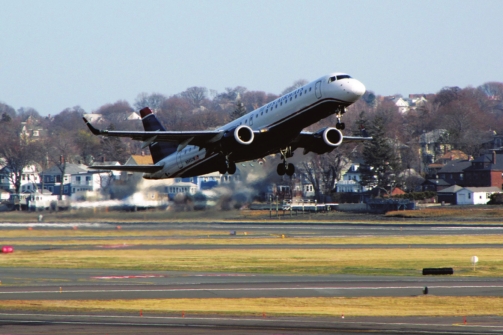
A runway closure at Logan International Airport will likely reduce flight traffic above the South End and other southern Boston neighborhoods, temporarily reducing sound and air pollution.
Runway 27 is expected to close sometime over the summer, Jennifer Mehigan of Massachusetts Port Authority media relations department confirmed in an email, to complete an Emergency Materials Arresting System (EMAS) project at the end of the runway.
An EMAS system is intended to stop an aircraft if it is about to go off the runway. Mehigan described it in the email as “sort of like those emergency highway runoff areas for tractor trailers.”
Logan
already has EMAS systems at the ends of Runways 33L and 22R, and
Massport has recently completed an EMAS project at Worcester Regional
Airport.
Mehigan did
not have the exact dates of when the project would begin but said that
major construction is coordinated with the airlines and operations. She
also was not able to say approximately how long the project would take
once it begins, only that they would be putting out a press release once
they had exact dates.
Aaron
Toffler, executive director of the Massport Community Advisory
Committee (CAC), said the group heard a presentation on the project
during their January general committee meeting.
“I
think they’re anticipating two different construction periods. One
would start sometime after July first of this year, 2025,” said Toffler.
“And then, you know, when they can’t do work anymore because of the
weather, they will pause that work, and then they will close the runway
again sometime after July first of 2026.”
Steve
Fox, chair of the South End Forum and the South End’s representative to
the CAC said that because of the way that Runway 27 is situated, with
departures coming off the tarmac and flying directly over neighborhoods
like South Boston, South End and Roxbury, the closure will mean less
noise and air pollution from airplanes in those areas.
It’s
not uncommon for neighbors to voice concerns to Fox about noise from
planes in the neighborhood, he says, and both noise pollution and air
pollution is frequently discussed by the CAC, which have only increased
as the airport has grown.
Fox
added that about 20 years ago, people in the South End knew that
flights would begin to take off from Runway 27 at about 8am, waking up
from the overhead rumble.
“Over
the past 20 years has shifted from an 8am start to what we’re now
seeing as 6am and some even beginning as early at 5:30am,” he said. “So,
what we’re seeing is the encroachment of the schedule of flights.”
But
it’s tricky for any kind of limits for flight times and runway usage to
be put in place, both Fox and Toffler said, as the FAA controls how
runways are used.
The closure of Runway 27 will also have impacts on other runways at Logan, Toffler said.
“When
one runway goes down, the others will have to take up the slack because
there’ll be a similar amount of traffic arriving and departing from the
airport,” said Toffler. “Those flights have to go somewhere, and they
will likely go to Runway 33.”
Toffler
added that during that January presentation, Massport officials
indicated that all runways at Logan will probably see some impact from
the closure, saying “the sort of intensity of that impact will depend on
wind and weather, which is always sort of the deciding, or the
determining factor as to which runway gets used.”